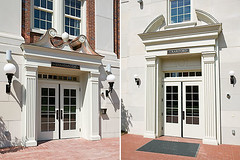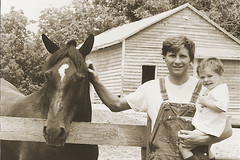
Thumbs Up for Residential Education
I read with great interest Whitney Weeks’ piece on the College Halls initiative [Fall 2007 issue, “Common Ground,” p. 52]. The article was informative and gave me a good overview of the entire College Halls vision. In particular, the sentence “Disengaged students make less of an academic
contribution to Vanderbilt and become un-enthusiastic, disconnected alumni” struck
a nerve.
Although somewhat of a loner by nature, I feel that my own experience at Vandy would have been greatly enhanced by the opportunities that seem available with The Commons and subsequent housing/learning facilities. Although the Greek system works well for many students, those outside that system will especially benefit from this new approach. Kudos to all those whose hard work is making this project a reality.
J. Eric Kindberg, BA’68
Charlotte, N.C.
I’ve just finished reading the article about The Commons and think the College Halls concept is a great idea by which to foster community among students and faculty.
As a Peabody alumna who lived in Memorial Hall (we called it UDC, of course) from September 1949 through May 1953, I’ve had special interest in watching the construction webcam as the new buildings took shape practically in my dorm’s backyard. I was interested, too, to read that the old dorms (Memorial, East, etc.) have been gutted and refurbished as part of The Commons plan.
I have many happy memories of all my four years at Peabody, including living in the dorm–roommates and friends, impromptu social events, sunbathing on the roof, hamburgers at the Krystal–elements that helped make up my college experience.
Because of Peabody’s small enrollment at that time, I felt a sense of community that I hope the College Halls will create for students now and in the future. I send my best wishes to all those involved in this new-old concept–especially the students.
Carolyn Whitaker Crowley, BA’53
Fort Worth, Texas

Government-Run Health Care Isn’t the Answer
I found the article “Big Shoulders, Deep Pockets, Tightened Belts” [Fall 2007 issue, p. 30] interesting but misdirected. Heath care in the U.S. is the best in the world thanks to facilities like Vanderbilt. The federal government is the worst place to put money decisions for my health care or anyone else’s.
As a small business owner, I offer medical insurance to employees. They choose if they want it. I pay 50 percent of the premium. It is available for families, if they choose. I pay competitive prices for coverage that is better than average. I price my product and services so that I can provide this medical insurance. I also pay worker’s compensation, state medical and federal medical taxes.
Nowhere in the article do you discuss the pricing of health-care products or services. Health care is the only U.S. industry I know of that is not controlled or influenced by competitive price technology.
I am sorry for the suffering of individuals injured because of negligence or stupidity or carelessness. To suggest that government should pay for medical services because someone does not have health insurance is wrong. The Hippocratic Oath is clear. Doctors who take that oath are aware of what it says. I do not ask a doctor to pay for my individual judgments. Why should he ask me to pay for his?
As a final point, you buried an item about “uninsurable immigrants” in the middle of the article. Prohibiting illegal immigration would reduce the burden on the health-care system.
Providing health care for less than 15 percent of the population by raising taxes and wages for medical professionals who chose the profession and reducing local control of the health system makes no sense.
Dan DeVore, BA’68
Atlanta

Hatfield Roots
Imagine my surprise when I turned to page 24 of the Fall 2007 issue [The Campus, “Tumors May Have Fueled Hatfield-McCoy Feud“] to see a picture of my husband’s grandmother and great-grandfather.
My husband, U. Grant Browning, MDiv’58, is the grandson of Betty Hatfield Caldwell and the great-grandson of [Hatfield clan patriarch] William Anderson “Devil Anse” Hatfield. Our daughter, Barbara Browning, BA’78, is the great-great-granddaughter of “Devil Anse.” The feud is an interesting part of our family history, but I never expected to see a connection to Vanderbilt.
Thank you for an informative article.
Elizabeth Meggs Browning, MA’54
Nashville
Transcendent Teacher
It was a pleasure to read the piece about Sylvia Hyman and her art [Fall 2007 issue, The Mind’s Eye, “Stories Told with Fictional Clay,” p. 61]. I first learned of the lady in 1967 when she was teaching in the ceramic studio next to my sculpture class. She had a love for clay and teaching that transcended her studio, and I changed my schedule the following term so I could benefit from her.
Her achievements as an artist are impressive, but they pale when compared to the devotion she gave to her teaching and her students. May she live forever!
James Adams, MA’68
Mankato, Minn.

The Simple Life
The Fall 2007 issue was the best Vanderbilt Magazine ever. After almost 82 years in this fascinating world, it was refreshing to learn that all of the technical advances made in my lifetime can’t bring us happiness.
I was thrilled to read that Logan Ward [“American Rustic,” p. 42] chopped a chicken neck, slopped hogs, read by kerosene lamp, and canned the vegetables of his labors. ‘Tis true we don’t enjoy life’s progress until we’ve been without.
Mary Tom Bass’ story on tobacco [Southern Journal, “The Crop That Built Carolina,” p. 88] was up my alley, too–bravo to Vandy for teaching us that you don’t get it all from books, but rather through life’s journey and those whose lives we touch.
I started at Vanderbilt in 1948 (the first experimental year for students going to both Peabody and Vanderbilt), joined American Airlines as a flight attendant, and continued going to the university. I received my degree on the run.
My son and his family are up-to-the-minute innovators–high-speed Internet, e-mail, iPods, you name it–but you will find me in the kitchen fixing chicken and dumplings. Living is an art, and the secret is to learn to live passionately.
Phila Hach, BS’49
Joelton, Tenn.
Poor Publishing Decision
I contributed a profile of Marie Wilson to the Spring 2007 edition of Vanderbilt Magazine. The article describes Wilson’s long career–in the Civil Rights Movement, community churches, higher education, electoral politics, leadership of the Ms. Foundation, and founding the White House Project.
For some reason, a reader named Daniel Gray used this piece to launch a nasty and false personal attack on me. For some reason, Vanderbilt Magazine Editor GayNelle Doll published the attack.
Gray calls me “a big supporter of the Roe v. Wade Supreme Court decision.” He writes of “an undeclared war that people like she [Ms. Wilson] and Mr. Euchner have waged against boys for several decades.” He says I “must not be happy” to learn about positive efforts like a midwifery program or an effort to save Kenyan children for adoption, and that I “must not have been thrilled with” former Chancellor Gordon Gee’s praise for a pro-life activist. Gray closes by expressing horror at “how many future Vanderbilt students have been eliminated” because of Roe–clearly implying that I would endorse such “elimination.”
In fact, I have never publicly expressed an opinion on Roe, either pro or con. Like most Americans, I am ambivalent about this issue. I respect greatly people on all sides of the issue who honestly and compassionately seek the best answers to abortion and related issues (e.g., sex education, strengthening the family, child care, adoption).
Vanderbilt’s decision to publish this nasty attack on me (and Marie Wilson)–false and defamatory in every way–was unconscionable.
I have urged Interim Chancellor Nicholas Zeppos to adopt a formal policy against publishing personal and libelous attacks in university publications. Vanderbilt has long celebrated its policy of open dialogue, which Chancellor Alexander Heard did so much to advance. Now Vanderbilt should embrace basic standards for honesty as well.
Charles Euchner, BA’82
New Haven, Conn.